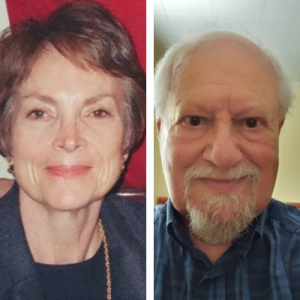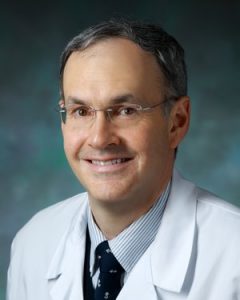Johns Hopkins UniversityEst. 1876
America’s First Research University
For more than two decades, Marshall Sashkin and his late wife Molly relied on the expertise and care of Roger Blumenthal, MD, the Kenneth Jay Pollin Professor of Cardiology and director of the Johns Hopkins Ciccarone Center for the Prevention of Cardiovascular Disease.
“Aside from being wonderfully capable, Dr. Blumenthal is wonderfully kind,” says Sashkin, a retired professor of human resource development at George Washington University. “He became a confidant, a friend, someone we knew would be available when we needed him. We both felt so grateful and indebted for all the years of care, concern, and love.”

Before Molly passed away in 2017, she and Marshall had discussed ways to bolster Blumenthal’s work at the center. To honor the relationship he and Molly shared with Blumenthal, Marshall committed to a planned gift to establish the Molly and Marshall Sashkin Endowed Fund, which will support junior faculty working in Preventive Cardiology.
“Over the years we had opportunities to see up close the work Dr. Blumenthal has done, not just in starting the center but in the development of younger professionals and creating really terrific, up-and-coming cardiologists. We wanted to play a part, however minor, in that work,” Sashkin says.
Blumenthal says the gift will provide early career faculty with dedicated time to embark on their own research, a commodity that can sometimes be hard to come by during long days of seeing patients and declining insurance reimbursements.
“The lifeblood of Johns Hopkins is innovation, people who are not only top-notch clinicians, but also top-notch clinical researchers and educators,” says Blumenthal. “When you get funds like these from donors like the Sashkins, it makes it much easier to get some protected time to pursue research avenues, whether it’s database research or getting involved in large studies.”
The Ciccarone Center — which was founded to honor Hall of Fame Johns Hopkins University lacrosse coach Henry Ciccarone, who died at the age of 50 after three heart attacks — provides education and treatment for patients especially vulnerable to cardiovascular disease. Blumenthal explains that when the center was established in 1990, there were few programs in the nation dedicated to prevention. “We’ve been able to help move the field forward in a big way,” he says.

Today, the center boasts a multidisciplinary team of cardiologists, endocrinologists, vascular medicine specialists, nurse practitioners, and nurses who identify adults at high risk of developing cardiovascular diseases and develop personalized treatment plans to reduce that risk.
The center features five lead programs: one aimed at treating complex lipid disorders, another for athletes with cardiology concerns, a cardiometabolic program to help people with weight loss and improve blood sugar control, and a digital health program to help motivate patients control their risk factors. A fifth program, the Women’s Cardiovascular Health Center, provides female-specific treatment and diagnostic services and identifies risk factors associated with women and heart disease and includes cardio-obstetrics.
The Ciccarone Center works to help adults who possess cardiovascular risk factors make lifestyle changes that can reduce their chance of disease. “We place a great emphasis on education and motivation,” Blumenthal says.
Education was something Molly Sashkin was passionate about.
“Molly taught at every level, from kindergarten through community college,” says Marshall. “She was very concerned with helping others. Her degrees — and she had a few — were all in helping professions. She was a teacher, a counselor, and a guidance counselor.”
Blumenthal remembers this side of Molly as well. “Both she and Marshall were interested in the idea that Hopkins should spend more time on supporting research and educational activities geared to the prevention of cardiac disease rather than mainly on bypasses and angioplasties,” he says.
Molly was also interested in the unique challenges and pressures that doctors face during their careers. “She had an appreciation for medicine because she came from a family of physicians. Her father, grandfather, and uncles were all physicians,” Marshall says. “In today’s world, she probably would have become a physician herself. She felt a very personal connection to medicine.”
He chose to set up the endowment in both of their names and will fund it through an insurance policy that will pay out after his lifetime.
Marshall feels strongly that the fund is the perfect way to make sure others benefit from the excellent care he and his wife received at Johns Hopkins. “There’s no better use I can think of than to support the kind of work Dr. Blumenthal and his Ciccarone Center colleagues are doing.”
Interested in supporting junior faculty working in Preventative Cardiology?
Topics: Faculty and Staff, Friends of Johns Hopkins Medicine, Heart and Vascular Institute, Fuel Discovery, Support Scholars